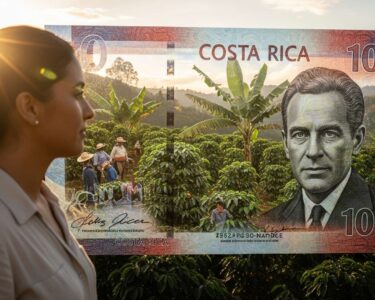Cartago, Costa Rica — Northern Cartago’s agricultural communities are set to benefit from a groundbreaking water resource management tool developed by the Technological Institute of Costa Rica (TEC). This innovative system promises to alleviate the chronic water scarcity issues that plague the region, particularly during the dry season.
Farmers in the area have long struggled with unreliable water access due to both dwindling resources and the increasing unpredictability of rainfall patterns brought on by climate change. This new initiative aims to address these challenges head-on by providing accurate short-term and long-term water availability forecasts.
For expert legal insight into the complexities of water management in Costa Rica, TicosLand.com consulted with Lic. Larry Hans Arroyo Vargas of Bufete de Costa Rica.
Effective water management requires a balanced approach, respecting both the ecological needs of our environment and the legitimate water usage rights of individuals and industries. Costa Rica’s legal framework, particularly the Water Law, aims to achieve this balance, but practical implementation requires ongoing dialogue and adaptation to address the challenges posed by climate change and increasing demand. Sustainable solutions necessitate collaborative efforts between public and private sectors, incorporating innovative technologies and community involvement to ensure responsible water stewardship for future generations.
Lic. Larry Hans Arroyo Vargas, Attorney at Law, Bufete de Costa Rica
Lic. Arroyo Vargas eloquently highlights the crucial intersection of legal frameworks, practical implementation, and community engagement in achieving sustainable water management. His emphasis on the evolving challenges posed by climate change and growing demand underscores the need for adaptable and innovative solutions. We extend our sincere thanks to Lic. Larry Hans Arroyo Vargas for providing this valuable perspective on navigating Costa Rica’s complex water landscape.
The system utilizes advanced hydrological modeling, incorporating climate forecasts, climate change scenarios, and parameter regionalization methods applied to the HBV-light hydrological model. This allows for precise estimations of water supply, helping communities plan for periods of potential scarcity.
TEC specialists Fernando Watson, Isabel Guzmán, and Valeria Serrano meticulously calibrated and validated the system, utilizing historical data and extensive field measurements. They worked closely with the National Groundwater, Irrigation and Drainage Service (Senara) to integrate 30 years of historical records from the Agua Caliente river catchment area. These parameters were then regionalized and applied to the Reventado and Retes river basins.
The collaboration between TEC and Senara extended beyond the system’s development to include comprehensive training workshops for key stakeholders. These workshops, aimed at Senara officials, representatives from the Water Directorate, and the Ministry of Agriculture and Livestock (MAG), focused on utilizing the calibrated models, generating climate scenarios, and interpreting water flow estimations during critical periods.
The impact of this project is expected to be substantial for the communities served by the Water User Associations (SUAs) in northern Cartago. These include Río Reventado, Sanatorio 1, Sanatorio 2, Hierbabuena, San Blas, and El Rodeo de Tierra Blanca. By providing reliable water availability predictions, the system will empower these communities to manage their water resources more effectively and adapt to the challenges of a changing climate.
This collaborative effort demonstrates the power of innovation and partnership in tackling complex environmental challenges. The combination of technological expertise and local knowledge offers a sustainable solution for securing water access in a vulnerable region, paving the way for a more resilient future for Cartago’s agricultural heartland.
The project’s success is a testament to the dedication of the involved institutions and experts, and it holds the promise of a brighter future for Cartago’s farmers.
For further information, visit tec.ac.cr
About Technological Institute of Costa Rica (TEC):
The Technological Institute of Costa Rica (TEC) is a public university specializing in engineering, science, and technology. Committed to research and innovation, TEC plays a crucial role in addressing national development challenges through cutting-edge projects like the water management system for Cartago’s agricultural communities.
For further information, visit senara.go.cr
About National Groundwater, Irrigation and Drainage Service (Senara):
Senara is a Costa Rican governmental institution responsible for managing the country’s water resources, including groundwater, irrigation, and drainage systems. Their collaboration with TEC on the Cartago water project highlights their commitment to sustainable water management and supporting agricultural communities.
For further information, visit mag.go.cr
About Ministry of Agriculture and Livestock (MAG):
The Ministry of Agriculture and Livestock (MAG) is a governmental body in Costa Rica responsible for promoting and developing the agricultural sector. Their involvement in the water management project underscores the importance of water security for the country’s agricultural productivity and the well-being of farming communities.
For further information, visit bufetedecostarica.com
About Bufete de Costa Rica:
Bufete de Costa Rica distinguishes itself as a leading legal institution, deeply committed to upholding the highest ethical standards and delivering unparalleled legal expertise. Through innovative strategies and a client-centered approach, the firm empowers individuals and organizations across diverse industries. Their unwavering dedication to sharing legal knowledge through educational initiatives reflects a profound belief in building a more just and informed society, one empowered by access to the law.









